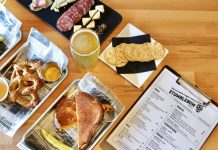
Itãs been some eight years since Harry Weaver III, 44, and Bernard Jackson, 43, launched Brewz Brothaz, a groundbreaking Facebook group for craft beer enthusiasts of color that also begat a podcast, and even now they hear occasionally from people who ask: ãWhy does it always have to be about race?ã
ãIãm not offended by it,ã says Jackson, a Detroit native who now works as a chef in Houston. ãWe canãt deny that there are certain inequities. And in the state of Michigan, there have been inequities that people are unwilling to talk about.ã
As with so many aspects of a culture long dominated by white people, Black and brown people not only have a history in the brewing industry but are also working to carve out a space for themselves today. The successful growth of the Facebook group, which started with a dozen members and has now exceeded 800, is a testament to the existence of a perhaps small but nonetheless growing and passionate community joined by both their passion for beer and their collective sense of feeling overlooked or ignored by the broader beer-loving world.
ãWe had conversations about underrepresentation of Black and brown people in the craft beer and liquor industry as a whole,ã Jackson says. ãWe talked about experiences we had as patrons at bars, feeling as if we werenãt necessarily welcome there. Weãd get looks as if we were in the wrong place.ã
The latest numbers back them up. The American craft beer industry is a blindingly white scene; of the more than 8,000 craft breweries, 88 percent are white-owned, according to a 2019 survey by the Brewers Association trade group. By contrast, just 1 percent ã or maybe as many as 80 ã are Black-owned, the survey showed. Whatãs more, most people who drink craft beer are white men, according to a 2018 study by Nielsen-Harris On Demand. In the brewhouse, the numbers are similar. Black people make up about 13 percent of the U.S. population, but just 1 percent of employees in craft breweries are Black, according to the Brewers Association survey.
ãI probably know or know of every Black craft beer enthusiast in the Detroit area,ã says Weaver, a diversity and equity consultant who lives in Canton. ãThatãs not to say I know a whole bunch of people. Thatãs to say thereãs not a whole bunch of us.ã
Born of Tragedyä» ä»
Brewz Brothaz emerged out of the most traumatic experience of Weaverãs life, a 2012 incident in which he was shot twice during a botched armed robbery outside the Prince Hall Grand Lodge on Detroitãs east side. Weaver, at the time a 6-foot-2-inch hulk of a man, was left paralyzed from the waist down and faced grueling months of recovery and rehabilitation to regain some basic abilities.
Amid all this, Weaver wondered what parts of his prior life he could preserve. Could he smoke a cigar every now and then? Wash it down with a glass of whiskey if he wanted?ä»
More important to Weaver, heãd been an imported-beer hobbyist for years and had fallen in love around 2008 with craft beer. Heãd seek out hard-to-find limited releases, making himself a regular at local craft breweries as he chased new flavor profiles being created by Michigan brewers. Could he enjoy a cold beer again?
A nurse at Detroit Receiving Hospital gave him his answer. ãShe was like, ãYou know what? You need to keep doing those things. Your life can be as normal as you make it,ãä»ã Weaver recalls. ãSo I made it a point to continue to enjoy those things. And just like everything else in my life, it took some time to ease back into that.ã
No one told his friends about the ãeasing inã process. By the time Weaver got home, a huge array of special-release craft beers waited for him thanks to an outpouring of generosity from his friends. And there was one more thing: an invitation from Jackson, his friend of more than 20 years, whom heãd met through mutual friends at a Detroit coffee shop, to help him launch a Facebook group.
Weaver and Jackson, once big fans of Guinness, discovered the craft-brew scene when they tried beers from Kalamazooãs Bellãs Brewery. From there, the hobby took off. Their instinct that people of color needed a space where they didnãt feel out of place in the craft world quickly proved prescient.ä»
ãComing into the group, I was never treated like I didnãt know what I was talking about,ã says Sasha Womble, a Black woman from Ypsilanti who co-hosts the Brewz Brothaz podcast.
The podcast, like the group, explores inclusion and diversity in craft beer. The appeal, however, goes well beyond creating an outlet for Black craft beer fans; Jackson believes at least half of the Facebook groupãs members are white. The important part is whatãs not present ã the elitist, know-it-all attitude that plagues so much of the craft-beer enthusiast world, discouraging beginner questions and mocking certain tastes. Says Womble: ãThey were happy to educate without being patronizing. As a woman, that was a big plus. I was never treated like a moron. Everybody is treated the same.ã
How Founders Lost Them ä»
The Facebook group and podcast have been important means of comparing experiences and discussing problematic elements of the industry. The podcast, launched in 2018, ranges in length from one to two hours, and was released regularly before the onset of the pandemic interfered with their favorite format ãrecording episodes from inside metro Detroit breweries. Topics range from interviews with brewers, such as master brewer Travis Fritts from the popular Old Nation Brewing in Marshall, to stories about experiences people have had when ãdrinking while Black.ã
Perhaps the hottest topic of discussion: a 2018 racial discrimination lawsuit against Michiganãs largest craft brewery, Founders Brewing Co., filed by a Black employee who alleged his termination was racially motivated. A leaked deposition from the case sparked a media blitz and online backlash that prompted Founders to close its Detroit site for more than three months ãout of concern of our employeesã safety.ã In the deposition, Founders general manager Dominic Ryan claimed not to know that the fired employee, a manager named Tracy Evans, was Black, which many found a baffling and tone-deaf defense that added credibility to Evansã claims of a callous and racist corporate culture. Shortly after the Ryan-Evans controversy erupted in the press, the lawsuit was dismissed amid a confidential out-of-court settlement.ä»
For Jackson and Weaver, the controversy felt personal; they followed Evansã case on the podcast even before the lawsuit was filed. ãIt definitely felt like a slap in the face,ã says Jackson, who says Founders makes many of the gateway beers that drew the duo into the hobby. Weaver, in fact, described himself as a ãFounders fan boyã before the Evans case surfaced, and says he had offered to lend his experience in diversity and inclusion training to Founders brass. ãThey really kinda blew me off, man, like they didnãt know what I was talking about,ã Weaver says.
Weaver and Jackson say Founders co-owner Dave Engbers talked with them over lunch after the controversy erupted, and that Engbers accepted an invitation to appear on the podcast. Following the lawsuit settlement announcement, though, Engbers stopped responding to either one of them again, Jackson and Weaver say. ãThat was the nail in the coffin,ã Weaver says. ãThe prevailing thought in the group is that we donãt drink Founders.ã
A public relations representative for Founders declined to comment.
That doesnãt mean Weaver has given up on the brand entirely. He says heãd still be willing to meet. ãI would sit at a table with them and tell them exactly why I stand where I stand,ã says Weaver, who adds that thereãs ãplenty of other craft breweries in Michiganã to give his money to in the meantime.
When it comes to the Brewz Brothaz and diversity and inclusion in the craft beer world, he says itãs ãway beyond beer at this point. Weãve become a voice thatãs sought out in the beer community. This is who you go to when you want a voice that represents a voice thatãs not always represented when we talk about beer.ã
|
| ä» |
|








